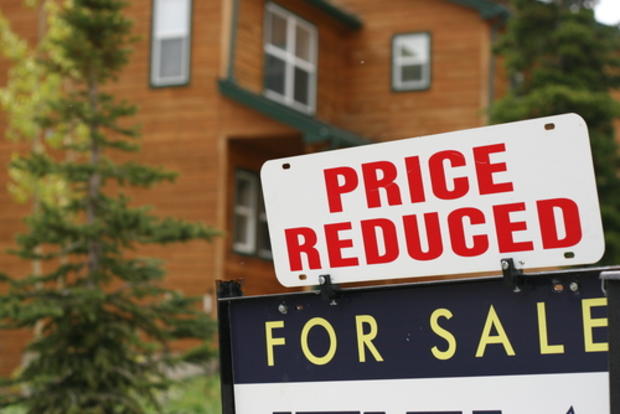Foreclosures reach lowest level since 2007
(MoneyWatch) Good news on the housing front: Foreclosure activity is at its lowest level since July 2007, according to new data from real-estate research firm RealtyTrac. In April, the number of default notices, scheduled auctions, and bank repossessions fell 5 percent from the previous month.
Foreclosure filings also fell year-over-year. One out of every 698 homes in the U.S. was hit with a foreclosure filing in April, a 14 percent decrease from April 2011. The number of properties repossessed by banks declined 7 percent from March and 26 percent from April 2011. Across the nation, 37 states and the District of Columbia saw a downturn in repossessions, known as real estate owned, or REO, transactions.
Lenders also seem to be getting serious about short-sales, in which lenders agree to sell a property for less than it's worth, as an alternative to foreclosures. That could help clear the housing sector of the excess inventory keeping home prices down.
Bank of America offers up to $30k for short saleBuilder sentiment rebounds from April lowsVIDEO: Signs of a turnaround in foreclosure market
"More distressed homes are being diverted into short sales rather than becoming completed foreclosures," RealtyTrace CEO Brandon Moore in a statement. "Our preliminary first-quarter sales data shows that pre-foreclosure sales -- typically short sales -- are on pace to outnumber sales of bank-owned properties during the quarter in California, Arizona, and 10 other states."
In late 2011 and early 2012, the ratio of short sales to foreclosures rose for five of the nation's top lenders, including Ally, Bank of America (BAC), Citigroup (C), JPMorgan Chase (JPM) and Wells Fargo (WFC). In fact, these companies averaged 1.5 REOs for every completed short sale. By comparison, all other lenders surveyed by RealtyTrac averaged 2.5 REOs for every short sale.
To combat the negative effects of foreclosure, some banks have begun offering incentives to borrowers who opt for a short sale instead of letting their home enter foreclosure. Bank of America recently announcedthat the company will offer up to $30,000 in relocation assistance to borrowers who complete qualifying short sales. Such programs suggest that some big banks are ready to consider short sales, rather than foreclosure.
Despite the national drop in foreclosures, more than half of U.S. states saw activity increase last month. Twenty-six states posted monthly increases in foreclosure starts, and 27 states posted annual jumps in activity. New Jersey and Utah saw the biggest rise in foreclosures, with property seizures soaring 180 percent and 179 percent, respectively. Indiana, Pennsylvania, Florida, and Michigan also saw a rise in foreclosures.
"Rising foreclosure activity in many states and local markets in April was masked at the national level by sizable decreases in hard-hit foreclosure states like California, Arizona, and Nevada," Moore said. "Those three states, and several other non-judicial foreclosure states like them, more efficiently processed foreclosures last year, resulting in fewer catch-up foreclosures this year."
This uptick in certain states indicates that lenders are catching up on a backlog of foreclosures that built up following revelations in 2010 that financial firms were using fraudulent documents in completing foreclosures. That should bring prices down short-term (because more houses will be on the market), but it will also help avoid another huge wave of foreclosures that could depress home values for years to come.
Short sales still make a dent in non-distressed property values, but they don't have as negative an effect as foreclosures do on the surrounding market. On average, short sales sell for about 80 percent of their value, according to the Mortgage Bankers Association.
By this measure, short sales amount to the light at the end of the long, dark tunnel through which the U.S. housing market has been slowly traveling since the 2008 subprime loan crisis. If all mortgage lenders follow the lead of the industry's biggest players, fewer homes will end up in foreclosure. That ultimately means fewer REOs sitting on the market, dragging down home prices for the entire neighborhood.
For more information about the government's foreclosure settlement, go to NationalMortgageSettlement.com. If you feel that you were wrongly foreclosed upon or received a foreclosure notice in error, go to IndependentForeclosureReview.com. If you're a homeowner and have questions about whether you qualify for a loan modification or refinancing under the Home Affordable Refinance Program (also known as HARP 2.0), contact the Homeowner's HOPE hotline at 1-888-995-HOPE or go to MakingHomeAffordable.gov.
